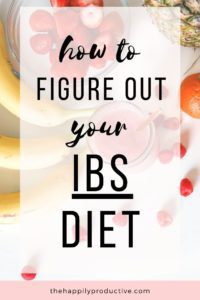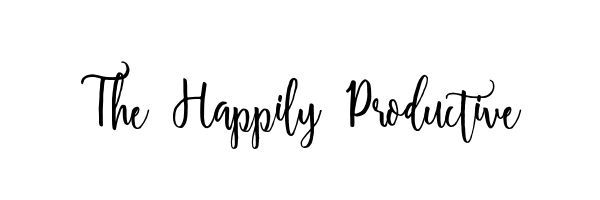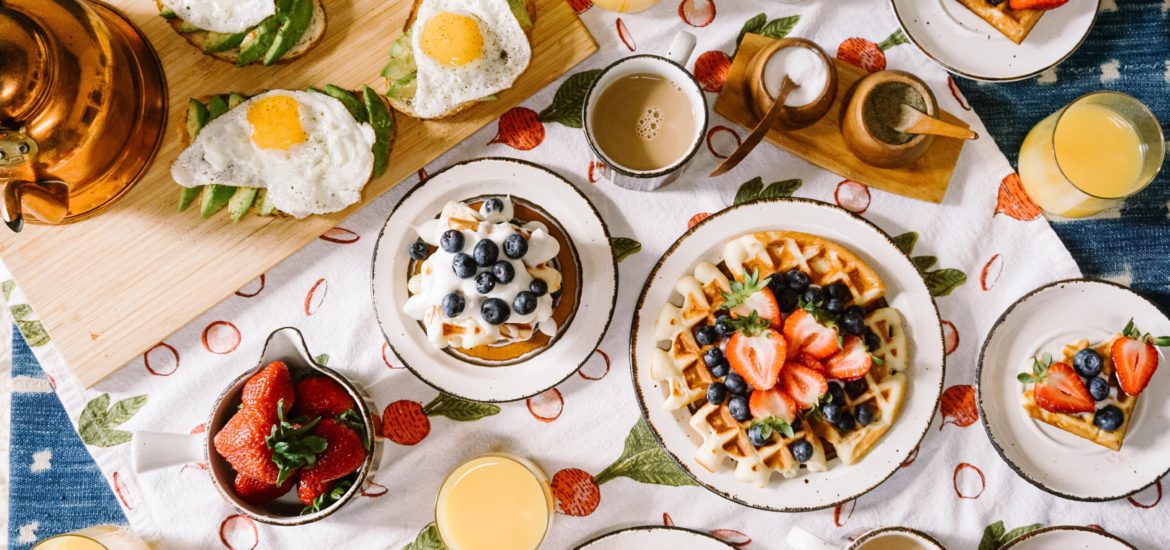If you have done some research on IBS diet, you probably came across the Low FODMAP diet that is supposed to help IBS. It’s specifically designed for IBS sufferers and consists of cutting out all high FODMAP foods at first. You then slowly introduce them back in one at a time in order to determine your trigger foods. The Low FODMAP diet is not an easy thing to do, but it does work for a lot of people. And if you’re like me, you’re willing to try anything to improve your IBS symptoms.
The Low FODMAP diet is the first thing that actually helped me get better.
You can read about it in my IBS story: I basically went from a total mess to a somewhat functional human being by cutting out high FODMAP foods. I’m not going to go into detail about how exactly it works. There are many great sources available on the internet and they explain it way better than I could. The bottom line is: if you haven’t tried the Low FODMAP diet yet and are searching for effective IBS relief, you should definitely give it your best shot.
This being said, I didn’t want to limit this post to only recommending the Low FODMAP diet. Instead, I also want to give you more specific tips based on my personal IBS-D diet, foods to avoid with IBS and foods to eat with IBS. Even though our bodies are all different, there are some common triggers that you might want to pay attention to. It will make living with IBS so much easier!
Avoid foods that have never worked for you
We all have foods that we don’t digest well, even without IBS. Before my IBS, things like cabbage, beans, onions, garlic, milk and tomato sauce would upset my stomach. If I would eat them now, I would have to sleep in the bathroom (believe me, I tried).
Chances are, if your body didn’t like foods before you had IBS, it will hate them even more now. I would suggest cutting them out of your IBS diet altogether. But if you want to try them, do so when you’re planning to stay at home for the next couple of days.
Try lactose-free dairy
Lactose is a major trigger for many IBS sufferers. Normal milk or yogurt don’t sit well with me, and while cheese is usually okay, getting the quantity right is not always easy.
However, lactose-free products work really well for me! I can have muesli with lactose-free milk without getting bloated whatsoever, whereas normal milk would trigger severe symptoms. If you love dairy and don’t want to switch to plant-based options, you should definitely give lactose-free products a go!
Avoid oily and fatty foods
It took me a very long time to figure out that fatty foods triggered my IBS. I recently started a food journal and it helped me realise that greasy foods were actually a trigger for me – whether I used butter, margarine, olive oil or anything else. You don’t have to exclude oils from your IBS diet (I certainly don’t), but check if too much fat could be a trigger for you as well!
Avoid too much gluten in your IBS diet
I don’t have a gluten intolerance, and I do fine with small amounts of gluten. But I have noticed (and my doctor confirmed that it is quite common) that big quantities of food containing gluten can act as IBS triggers. This just means that you might want to go for rice instead of pasta, and avoid eating too much bread.
Don’t eat too much chocolate
Unfortunately, chocolate definitely is an IBS trigger for me. Knowing how much I love chocolate it is the hardest to limit, too. I’m still unsure of what exact ingredient in chocolate triggers my IBS, but I know that any form of chocolate, even cocoa with lactose-free milk, can cause IBS symptoms for me. I’m usually okay if I only eat a little bit, but it’s something I have to be very careful about.
Green vegetables and whole grains can be IBS triggers
High fiber foods like green vegetables can leave me really bloated, even if I don’t eat a lot. The same goes for whole grains – I just don’t digest them well. It’s such a shame because they’re supposed to be healthy foods, but I’m just not ready to deal with my IBS symptoms in order to eat “healthy”.
Fruit can be an IBS trigger
As a common trigger, eating too much fructose can cause IBS flare-ups. Personally, I am fine with eating berries, grapefruit, and clementine. Watermelon and orange juice, however, are excluded from my IBS diet.
Quinoa and tomatoes
I’m adding this to the list just in case anyone is like me. No-one talks about quinoa or tomatoes as a trigger food but they are honestly the absolute worst for me.
I had quinoa twice since my IBS started, and both times I felt like my intestines were being ripped apart with a knife. I was honestly close to calling an ambulance because I didn’t believe that an IBS attack could hurt that much. No other food did this to me! I just wanted to put it out there in case someone else is as sensitive to quinoa as I am. Especially since it is such a popular food!
As for tomatoes, they aren’t quite as bad if I only eat a little. But bigger quantities (any more than half a tomato) or tomato sauce send me straight to the bathroom. Not fun at all.
Safe foods in my IBS diet
I thought I would include a list of my “safe” foods as well. Living with IBS is all about knowing how to stay safe! But please keep in mind that what works for me might not work for you. I also want to say that I have already gotten IBS flare-ups after eating one of my safe foods, but it’s very rare and always depends on my stress level and other factors as well.
- If I have to go out to eat, I always, always go to a Japanese restaurant. I always order Chirashi (a bowl of rice with raw fish), and I almost never have any problems with it.
- Potatoes or rice and chicken nuggets are good foods for IBS as well. It’s such a kid’s meal, but I make it all the time and it’s almost always okay for me.
- Red berries. For some reason, berries work really well for me. In the summer, I love blending frozen berries and soya yogurt and creating something that resembles an açaï bowl (but without açaï). I eat it every day in the summer and it doesn’t trigger my IBS.
Sadly enough, the list ends here! I can eat other things too, but I always go back to these foods when I want to be safe. Lettuce, carrots, and paprika are good foods for me too, and so is rice, potatoes, chicken and fish, but it really depends on the actual meal.

I really hope that my list has given you ideas on how to work out your IBS diet! Please remember that you have to try things for yourself to decide if they work for you.
Also, I would love it if you could leave your trigger foods and safe foods in the comments! This way I and other readers can benefit from your experience as well. And don’t forget to always stay positive. 🙂
If this post helped you, I would really appreciate if you shared it with other IBS sufferers!


Onions, Muffins, Biscuits, Milk and Raisins are my biggest triggers.
Thank you for sharing! 🙂
Chocolate is a definite, and the better the quality, the worse it would be. Red meat is another. I limit that to once every 7-10 days. I love steak and roast so I will still eat it just in smaller portions and less frequently. I rarely drink milk so that’s not too bad. I love cheese and surprisingly to me, the harder cheeses are worse than softer (I would think it would be the other way around, but everyone is different).
Thanks for sharing! It’s crazy how different this is for everyone…